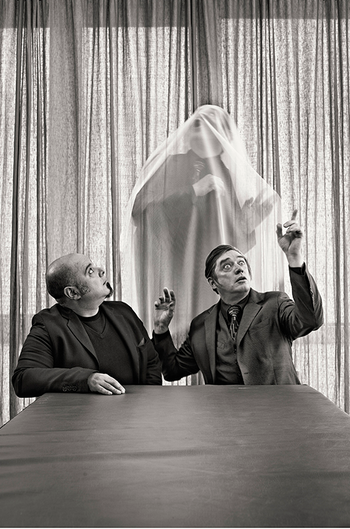One the best albums of the year was made by a German and an Italian. According to Teho Teardo, Still Smiling, his intriguing collaboration with Einstürzende Neubauten architect Blixa Bargeld, is the living proof that Berlin and Rome are sometimes on the same page. At least artistically. The odd couple is one of the highlights of this year’s Autumn Falls festival.
The Italian composer tells us that in his homeland, Still Smiling has already won a number of prizes, including one for “best independent album of the year”. “That means a lot, especially since a non-Italian is sharing the honour,” he’s quick to emphasise the merits of his new artistic partner in crime. For years, the German Blixa Bargeld (54) was the driving force behind The Bad Seeds, Nick Cave’s backing band, while he also directed the troops of the post-industrial noise-combo Einstürzende Neubauten in between. In recent years, he has been noted particularly for his superlative work with the experimental sound artist Alva Noto.
“It also means that our record masters the art of communication with different audiences in different cultures,” Teho Teardo (47) goes on. The Italian artist was a Neubauten fan from the very beginning, and also has an industrial past himself. In the 1990s, he was a member of the rock band Meathead and collaborated with people like sound artist Lydia Lunch, rock musician Scott McCloud, and cellist Erik Friedlander. More recently, he has devoted himself mainly to writing scores for film and theatre. Ennio Morricone is a fan.
Our protagonists first met during the preparations for the theatre production Ingiuria (2011). They wrote the song “A Quiet Life” together, which played during the closing credits of the film Una vita tranquilla, and they decided almost immediately to compose an album of real songs: sung by Bargeld in German, English, and Italian, accompanied by Teardo’s baritone guitar, and sporadically peppered with the strings of the Balanescu Quartet. “Yes, I am well aware that the average Neubauten fan will be surprised by the intimate, almost meditative chamber orchestra sound on the album, but we both wanted to do something different,” Teardo goes on, adding that they think their autumnal tonal range is perfectly cast for the Autumn Falls Festival. “We didn’t plan it, but there are almost no beats or pronounced rhythms.”
“We consciously chose to share studio experiences,” says Teardo, “alternately in the Neubauten studio in Berlin and in my home studio in Rome. That contributes to the album’s typically European character, which is also expressed in the melodies, the harmonies, and the consciousness of the lyrics.”
Teho Teardo & Blixa Bargeld cone Autumn Falls

This is Blixa’s first time to sing in Italian. Were you his language coach?
Teho Teardo: Of course I helped him, but he wrote the texts with a Germanic scholar of Italian descent. We did have to pay attention to his pronunciation during the recordings. But Blixa’s Italian is actually just really good. He visits Italy often, he’s very curious, and he’s fascinated by languages and cultures. The first single “Mi Scusi” became an instant hit in Italy.
Isn’t that the song on which he apologises for his poor Italian?
Teardo: Yes, a very clever trick of his. “First I’ll apologise,” he told me, “and then I’ll be able to do whatever I want.” [Laughs]
Blixa sings in three languages, and has an impressive track record for cross-border collaboration. What is your contribution to the underlying European idea on Still Smiling?
Teardo: It was especially on Music for Wilder Mann, the soundtrack I wrote to the French photographer Charles Fréger’s photographs that I developed a deeper interest in transcending borders. Fréger is primitive, uncontaminated, and very pure. It was something I could really work with. Since then, I’ve become used to translating images into music. To me that is not the same thing as providing commentary to images. I think that would be too didactic. The process is more natural: when I hear sounds, I see them, and vice versa.
Teho Teardo: Of course I helped him, but he wrote the texts with a Germanic scholar of Italian descent. We did have to pay attention to his pronunciation during the recordings. But Blixa’s Italian is actually just really good. He visits Italy often, he’s very curious, and he’s fascinated by languages and cultures. The first single “Mi Scusi” became an instant hit in Italy.
Isn’t that the song on which he apologises for his poor Italian?
Teardo: Yes, a very clever trick of his. “First I’ll apologise,” he told me, “and then I’ll be able to do whatever I want.” [Laughs]
Blixa sings in three languages, and has an impressive track record for cross-border collaboration. What is your contribution to the underlying European idea on Still Smiling?
Teardo: It was especially on Music for Wilder Mann, the soundtrack I wrote to the French photographer Charles Fréger’s photographs that I developed a deeper interest in transcending borders. Fréger is primitive, uncontaminated, and very pure. It was something I could really work with. Since then, I’ve become used to translating images into music. To me that is not the same thing as providing commentary to images. I think that would be too didactic. The process is more natural: when I hear sounds, I see them, and vice versa.

At the FotoMuseum in Antwerp last year, Fréger told me that he preferred to shoot his dressed up wild men in a wintery landscape because the winter kills everything and is thus symbolic of new life on the horizon.
Teardo: That complete metamorphosis is also a theme on Still Smiling. On the one hand, as an artist you have to keep the possibility of renewing yourself open all the time. Otherwise you become formulaic, and that is Blixa’s and my greatest fear. We always want to try something new. That is why our next album, which we have actually already started working on, will be very different again. On the other hand, the link is more concrete. For example, “Axolotl” refers to complete change. The lyrics are based on an essay by the Italian philosopher Giorgio Agamben. He wrote about an amphibian that dies before reaching adulthood, and which is injected with hormones to keep it alive.
Forgive the association, but how is the Italian artistic world managing to survive?
Teardo: Barely. 20 years of Berlusconi was terribly depressing. But we do also have to admit that he appealed to a large segment of the population. They voted for him… I didn’t. So we couldn’t escape it. And we had the misfortune of being dragged into a deep recession at the same time, which resulted not only from a financial, but also from a structural crisis. Circumstances like that didn’t make it easy for us to work. The government was out to destroy the artistic sector, and was actually successful on many levels. Nowadays I sometimes don’t even feel like I’m in Europe when I’m in Italy. We are trailing far behind other EU states. And I have the good fortune of being able to travel a lot for work, and thus feel like I’m still connected to the rest of the continent. But the country itself seems to have lost that connection. It’s as though the chord has been severed. And that is a great shame because we have enormous potential…
Is music your antidote?
Teardo: Of course, as an artist you are a living objection. Those aren’t my words, but those of Pier Paolo Pasolini. Unfortunately, many young, intelligent people have already left the country. [Without a hint of cynicism] They move to Berlin or something. It isn’t only an enormous demographic deficit, you also lose the more creative people because they get no opportunities to develop their potential here. I will always come back because I can afford to, and take my responsibility. I just hope the others don’t all leave. Otherwise nothing will change.
Teho Teardo & Blixa Bargeld • 1/12, 21.00, Ancienne Belgique
Autumn falls • > 6/12, verschillende locaties/divers lieux/Various locations, www.autumnfalls.be
Teardo: That complete metamorphosis is also a theme on Still Smiling. On the one hand, as an artist you have to keep the possibility of renewing yourself open all the time. Otherwise you become formulaic, and that is Blixa’s and my greatest fear. We always want to try something new. That is why our next album, which we have actually already started working on, will be very different again. On the other hand, the link is more concrete. For example, “Axolotl” refers to complete change. The lyrics are based on an essay by the Italian philosopher Giorgio Agamben. He wrote about an amphibian that dies before reaching adulthood, and which is injected with hormones to keep it alive.
Forgive the association, but how is the Italian artistic world managing to survive?
Teardo: Barely. 20 years of Berlusconi was terribly depressing. But we do also have to admit that he appealed to a large segment of the population. They voted for him… I didn’t. So we couldn’t escape it. And we had the misfortune of being dragged into a deep recession at the same time, which resulted not only from a financial, but also from a structural crisis. Circumstances like that didn’t make it easy for us to work. The government was out to destroy the artistic sector, and was actually successful on many levels. Nowadays I sometimes don’t even feel like I’m in Europe when I’m in Italy. We are trailing far behind other EU states. And I have the good fortune of being able to travel a lot for work, and thus feel like I’m still connected to the rest of the continent. But the country itself seems to have lost that connection. It’s as though the chord has been severed. And that is a great shame because we have enormous potential…
Is music your antidote?
Teardo: Of course, as an artist you are a living objection. Those aren’t my words, but those of Pier Paolo Pasolini. Unfortunately, many young, intelligent people have already left the country. [Without a hint of cynicism] They move to Berlin or something. It isn’t only an enormous demographic deficit, you also lose the more creative people because they get no opportunities to develop their potential here. I will always come back because I can afford to, and take my responsibility. I just hope the others don’t all leave. Otherwise nothing will change.
Teho Teardo & Blixa Bargeld • 1/12, 21.00, Ancienne Belgique
Autumn falls • > 6/12, verschillende locaties/divers lieux/Various locations, www.autumnfalls.be
Read more about: Muziek, Events & Festivals
Fijn dat je wil reageren. Wie reageert, gaat akkoord met onze huisregels. Hoe reageren via Disqus? Een woordje uitleg.